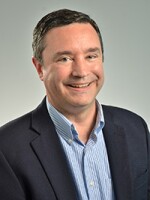Innovation, it is sometimes said, is finding a new way to solve a problem.
In 2003, would-be entrepreneurs in Kansas City had a problem, according to Maria Meyers. There were plenty of resources available to help with starting up a business—but nobody could find them. There was no central hub linking those resources together so that one could find idea incubators, funding sources, lending programs, patent attorneys, small business development centers in any sort of accessible and efficient way.
And so an innovation was born.
Meyers directs the UMKC Innovation Center and is the founder of one of its signature programs, KCSourceLink. Together with its national component, USSourceLink, Meyers and her team work with dozens of cities around the country to connect the resources needed for startups, inventors and potential founders of the next big thing.
As part of the Innovation KC series, Meyers talked with me about the unique challenges and opportunities faced by entrepreneurs in Kansas City, ways that access to capital for innovation might be improved here, and her own sense of satisfaction with her work helping others build:
On the meaning of innovation
So innovation is a process, and the process is finding new ways to creatively solve problems. So you can be, for instance, a restaurant, and we have a lot of restaurants, but you might serve your meals in an innovative way, or you may attract your customer in an innovative way. And that's where the innovation comes in: A new way to meet the market. A new way to find a customer. I think that when we started out building what we built—support for entrepreneurship through KC SourceLink, through the UMKC Innovation Center—we started by trying to understand the issues in the market and trying to clearly understand things that were gaps. And so we went along filling the gaps, which is what entrepreneurs do.
On her own background for becoming a leader of innovation
So my background prior to KC SourceLink is I had worked in a number of nonprofits, and I had worked in a number of very large corporate environments, as well as very small startups. And so my background, including startups in telecom and biotech and building out large non-profit organizations, as well as background in automating a variety of different functions for groups like Westinghouse. So I had sort of a project management past and leadership past that operated in a variety of different environments. So it's interesting, because I can understand a lot of the issues that a variety of different people have with businesses in a large path of different industries.
On the unique capacities for innovation in various cities
Every community has their own uniquenesses and their own strengths, and their own entrepreneurial ecosystems. And you know, some cities will say, "We have so many terrific higher educational institutions that are doing great research." Or some of them will say, "we have the most incredible geography here because we have mountains and oceans." Here in Kansas City, we have collaboration, which is interesting. We're also in the middle of and area where we have sort of that one degree of separation. People will pick up the phone and call people and they'll answer and they'll set up a meeting and they'll talk to them. And it's really kind of unique here.
On improving access to capital in Kansas City
I think there are a number of things we can do to improve access to capital here. First of all, we don't have as many funds as we could where people come together to invest, and getting an education now to the people in Kansas City that have the capacity to be involved in investing and giving them a good education on how to do that is certainly one of the things that we can do. And we kind of have to do this all-in. We're also looking at some of the mechanisms that are available, through the federal government especially, that we are not taking advantage of right now, and we're working with groups to help make that happen.
On building something to help others build something
I've really been building something this whole time. We started KCSourceLink from really a piece of paper that said, "We have a problem; what can we do to fix the problem?" We've certainly been building USSourceLink across the country, as well. Wnd even the UMKC Innovation Center—we've been building new programs and services through there that fill gaps: Whiteboard2Boardroom is working with researchers to get technology in the hands of entrepreneurs; Digital Sandbox KC helps with proof-of-concept funding. So I think when that stops building, that's when I'll get tired of it. But so far, we keep building.
This interview was part of Innovation KC, a series of conversations about innovation and innovators in Kansas City. To suggest Kansas City innovators for future interviews, send us an email, tweetus, or find us on Facebook.
Brian Ellison is a host/contributor at KCUR. You can reach him at brian@kcur.org or on Twitter @ptsbrian.
KCUR is an editorially independent station licensed to the Curators of the University of Missouri.






